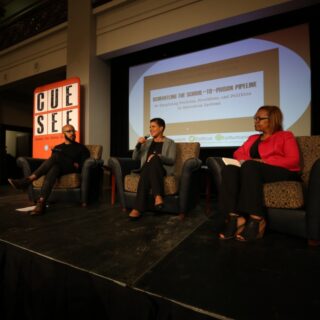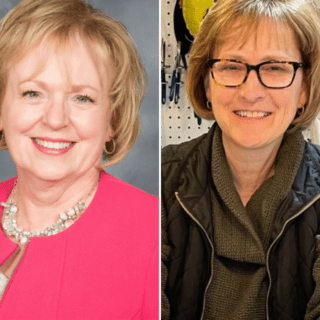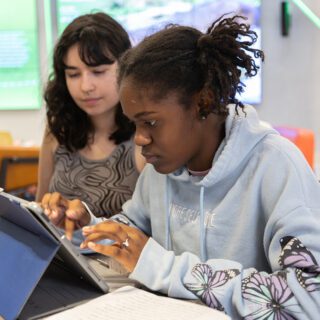
Black Lives Matter in Schools Virtual Event Series Spotlights Conversations on Racial Justice
The University of Pittsburgh School of Education marked the beginning of Black History Month in February with the Black Lives Matter in Schools Virtual Event Series. Open to the public, the two webinars were part of a nationwide, weeklong effort intended to lift up Black voices and spark conversation about racial justice in P-12 (preschool through twelfth grade) schools.
The Educators for Black Lives webinar was moderated on February 2, 2021, by Pitt faculty member Kari Kokka and featured Jesse Hagopian and Denisha Jones. Hagopian and Jones discussed their recent book, “An Uprising for Educational Justice: Black Lives Matter At School,” and the Black Lives Matter (BLM) in School movement.
Hagopian explained that the book draws its perspective from an often overlooked source in education: students.
“The students know the reality of their situation,” said Hagopian. “Some of the most powerful voices in the book are from the youth.”
According to Hagopian and Jones, the Black Lives Matter in Schools movement calls for a radical shift in the way Blackness is taught to students.
“If you ask most people what the first thing they learned about Black history is, it’s enslavement,” said Jones. “Why do we think that’s a good place to start for children?”
“Before they learn about enslavement, they should learn about Black villages and Black families. Before learning about the civil war, they should learn about the joys of being Black. The movement is to develop pedagogy that helps all children, especially Black children, to develop a love and appreciation for Blackness,” said Jones.
Hagopian explained the four key demands of the Black Lives Matter in Schools Movement: “End ‘zero tolerance’ discipline, and implement restorative justice, hire more black teachers, mandate Black history and ethnic studies in K-12 curriculum, and fund counselors, not cops.”
Both Hagopian and Jones emphasized the importance of all four demands in building a better educational future for children.
“BLM in Schools is critical because it is a response to white supremacy and how it has taken over in schools. It has taken away the love of discovering something new and replaced it with standardized tests, police, and metal detectors,” said Hagopian.
The BLM in Schools discussion continued the following night, on February 3, 2021, with the Youth Organizing Webinar.
C’Enna Crosby, a student in the Pitt School of Education’s CASE Teacher Preparation program and a leader of the Black Action Society, moderated the conversation with Nicholas Anglin and Chris Rogers, the national curriculum chair for BLM in Schools.
Rogers, the national curriculum chair for BLM in Schools, has created and curated resources for educators to hold a BLM in Schools week of action at their school and to help them talk with their students about racial justice.
Anglin, founder of Young, Black, and Educated and a Temple University student, started Civil Saturdays, a weekly youth-led protest held every Saturday calling for changes to PA Section 508. The code, known as the use-of-force law in Pennsylvania, creates a subject standard for when police officers can use deadly force. Anglin said that this puts “an officer’s personal biases into the equation of whether the use of deadly force is justified.” He and his organization are demanding these changes to hold police more accountable.
Anglin explained that his frustration with the short-lived media attention following the killing of George Floyd inspired him to create Civil Saturdays. “I felt like protests usually die down after a few weeks. So I wanted to be consistent,” he said. The group has protested every Saturday since December 2020.
Rogers echoed Anglin’s call for ongoing, not sporadic, activism for racial justice.
“The BLM in Schools week of action is a way to lift up all of the organizing that takes place throughout the year. It’s about what we’re doing in the long haul,” said Rogers.
The audience polls conducted during both webinars revealed an audience consisting of P-12 educators, higher education educators, university students, parents, and P-12 students, all coming together to advance the cause of BLM in Schools.
Kokka, the faculty member in the Department of Teaching, Leading, and Learning who helped to organize the event, reflected on the week’s success.
“I hope that the BLM in Schools Week of Action inspires our School of Education community to deepen our commitments to equity and justice,” said Kokka. “It’s important to listen to and raise up Black voices, and I am grateful to and deeply inspired by Dr. Denisha Jones, Jesse Hagopian, Chris Rogers, Nick Anglin, and C’enna Crosby for sharing with us. They remind us that community organizing requires a lifelong commitment to the work,” said Kokka.
Continue the Conversation on Twitter
Black Lives Matter at School: @BLMAtSchool
Chris Rogers: @justmaybechris
Black, Young, and Educated: @blackyoungedu
Pitt Black Action Society: @pittBAS
Pitt Education: @PittEducation
View the Webinar Recordings




